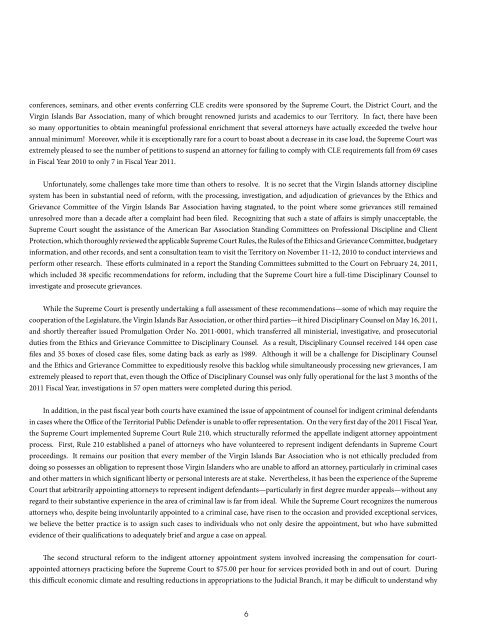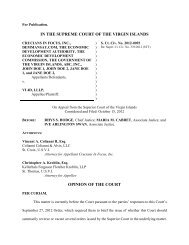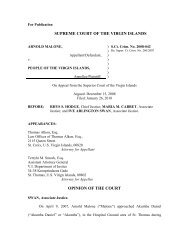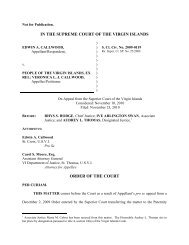2011 Annual Report - Supreme Court of the Virgin Islands
2011 Annual Report - Supreme Court of the Virgin Islands
2011 Annual Report - Supreme Court of the Virgin Islands
Create successful ePaper yourself
Turn your PDF publications into a flip-book with our unique Google optimized e-Paper software.
conferences, seminars, and o<strong>the</strong>r events conferring CLE credits were sponsored by <strong>the</strong> <strong>Supreme</strong> <strong>Court</strong>, <strong>the</strong> District <strong>Court</strong>, and <strong>the</strong><strong>Virgin</strong> <strong>Islands</strong> Bar Association, many <strong>of</strong> which brought renowned jurists and academics to our Territory. In fact, <strong>the</strong>re have beenso many opportunities to obtain meaningful pr<strong>of</strong>essional enrichment that several attorneys have actually exceeded <strong>the</strong> twelve hourannual minimum! Moreover, while it is exceptionally rare for a court to boast about a decrease in its case load, <strong>the</strong> <strong>Supreme</strong> <strong>Court</strong> wasextremely pleased to see <strong>the</strong> number <strong>of</strong> petitions to suspend an attorney for failing to comply with CLE requirements fall from 69 casesin Fiscal Year 2010 to only 7 in Fiscal Year <strong>2011</strong>.Unfortunately, some challenges take more time than o<strong>the</strong>rs to resolve. It is no secret that <strong>the</strong> <strong>Virgin</strong> <strong>Islands</strong> attorney disciplinesystem has been in substantial need <strong>of</strong> reform, with <strong>the</strong> processing, investigation, and adjudication <strong>of</strong> grievances by <strong>the</strong> Ethics andGrievance Committee <strong>of</strong> <strong>the</strong> <strong>Virgin</strong> <strong>Islands</strong> Bar Association having stagnated, to <strong>the</strong> point where some grievances still remainedunresolved more than a decade after a complaint had been filed. Recognizing that such a state <strong>of</strong> affairs is simply unacceptable, <strong>the</strong><strong>Supreme</strong> <strong>Court</strong> sought <strong>the</strong> assistance <strong>of</strong> <strong>the</strong> American Bar Association Standing Committees on Pr<strong>of</strong>essional Discipline and ClientProtection, which thoroughly reviewed <strong>the</strong> applicable <strong>Supreme</strong> <strong>Court</strong> Rules, <strong>the</strong> Rules <strong>of</strong> <strong>the</strong> Ethics and Grievance Committee, budgetaryinformation, and o<strong>the</strong>r records, and sent a consultation team to visit <strong>the</strong> Territory on November 11-12, 2010 to conduct interviews andperform o<strong>the</strong>r research. These efforts culminated in a report <strong>the</strong> Standing Committees submitted to <strong>the</strong> <strong>Court</strong> on February 24, <strong>2011</strong>,which included 38 specific recommendations for reform, including that <strong>the</strong> <strong>Supreme</strong> <strong>Court</strong> hire a full-time Disciplinary Counsel toinvestigate and prosecute grievances.While <strong>the</strong> <strong>Supreme</strong> <strong>Court</strong> is presently undertaking a full assessment <strong>of</strong> <strong>the</strong>se recommendations—some <strong>of</strong> which may require <strong>the</strong>cooperation <strong>of</strong> <strong>the</strong> Legislature, <strong>the</strong> <strong>Virgin</strong> <strong>Islands</strong> Bar Association, or o<strong>the</strong>r third parties—it hired Disciplinary Counsel on May 16, <strong>2011</strong>,and shortly <strong>the</strong>reafter issued Promulgation Order No. <strong>2011</strong>-0001, which transferred all ministerial, investigative, and prosecutorialduties from <strong>the</strong> Ethics and Grievance Committee to Disciplinary Counsel. As a result, Disciplinary Counsel received 144 open casefiles and 35 boxes <strong>of</strong> closed case files, some dating back as early as 1989. Although it will be a challenge for Disciplinary Counseland <strong>the</strong> Ethics and Grievance Committee to expeditiously resolve this backlog while simultaneously processing new grievances, I amextremely pleased to report that, even though <strong>the</strong> Office <strong>of</strong> Disciplinary Counsel was only fully operational for <strong>the</strong> last 3 months <strong>of</strong> <strong>the</strong><strong>2011</strong> Fiscal Year, investigations in 57 open matters were completed during this period.In addition, in <strong>the</strong> past fiscal year both courts have examined <strong>the</strong> issue <strong>of</strong> appointment <strong>of</strong> counsel for indigent criminal defendantsin cases where <strong>the</strong> Office <strong>of</strong> <strong>the</strong> Territorial Public Defender is unable to <strong>of</strong>fer representation. On <strong>the</strong> very first day <strong>of</strong> <strong>the</strong> <strong>2011</strong> Fiscal Year,<strong>the</strong> <strong>Supreme</strong> <strong>Court</strong> implemented <strong>Supreme</strong> <strong>Court</strong> Rule 210, which structurally reformed <strong>the</strong> appellate indigent attorney appointmentprocess. First, Rule 210 established a panel <strong>of</strong> attorneys who have volunteered to represent indigent defendants in <strong>Supreme</strong> <strong>Court</strong>proceedings. It remains our position that every member <strong>of</strong> <strong>the</strong> <strong>Virgin</strong> <strong>Islands</strong> Bar Association who is not ethically precluded fromdoing so possesses an obligation to represent those <strong>Virgin</strong> Islanders who are unable to afford an attorney, particularly in criminal casesand o<strong>the</strong>r matters in which significant liberty or personal interests are at stake. Never<strong>the</strong>less, it has been <strong>the</strong> experience <strong>of</strong> <strong>the</strong> <strong>Supreme</strong><strong>Court</strong> that arbitrarily appointing attorneys to represent indigent defendants—particularly in first degree murder appeals—without anyregard to <strong>the</strong>ir substantive experience in <strong>the</strong> area <strong>of</strong> criminal law is far from ideal. While <strong>the</strong> <strong>Supreme</strong> <strong>Court</strong> recognizes <strong>the</strong> numerousattorneys who, despite being involuntarily appointed to a criminal case, have risen to <strong>the</strong> occasion and provided exceptional services,we believe <strong>the</strong> better practice is to assign such cases to individuals who not only desire <strong>the</strong> appointment, but who have submittedevidence <strong>of</strong> <strong>the</strong>ir qualifications to adequately brief and argue a case on appeal.The second structural reform to <strong>the</strong> indigent attorney appointment system involved increasing <strong>the</strong> compensation for courtappointedattorneys practicing before <strong>the</strong> <strong>Supreme</strong> <strong>Court</strong> to $75.00 per hour for services provided both in and out <strong>of</strong> court. Duringthis difficult economic climate and resulting reductions in appropriations to <strong>the</strong> Judicial Branch, it may be difficult to understand why6
















